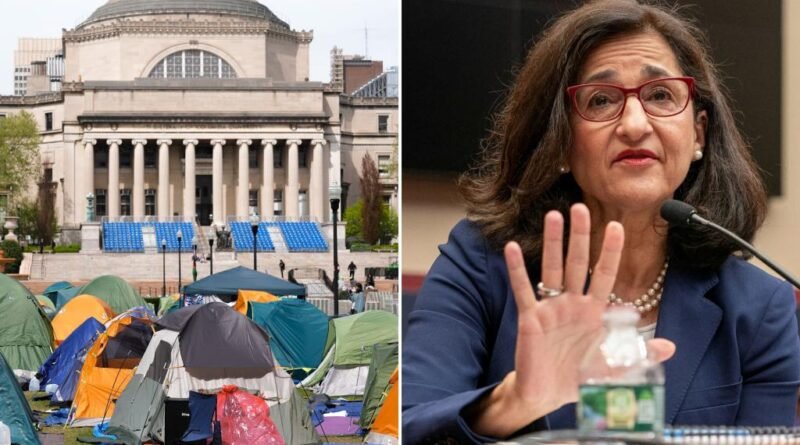Columbia appears to be ill-equipped for upcoming campus protest threats

With the approaching back-to-school season, students and faculty are gearing up to return to campus — and potential protests.
Pro-Palestine demonstrators who caused chaos at Columbia University in the spring have already announced their intentions to return as the fall semester commences on September 3.
So, what is Columbia University doing to address this? The overall plan is unclear, but their initial approach seems minimal.
In an email sent on July 24 to students, faculty, and staff, university president Minouche Shafik mentioned that her team is actively working on fostering community, establishing rules, and defining discrimination in anticipation of the upcoming semester.
“We truly thrive when we engage with diverse perspectives based on mutual respect and a dedication to thorough and open inquiry,” Shafik stated in the communication.
While acknowledging that freedom of speech is fundamental to a liberal education, something that Columbia aims to provide its students, the university’s corrective actions may be insufficient and belated.
Radical activists on campus have demonstrated their willingness to face arrests in solidarity with their cause. University-sponsored efforts to foster unity are unlikely to change their stance.
According to Shafik, the university is launching “community-building” programs like Dialogue Across Differences, which offers seed grants for relevant student and faculty projects, and Campus Conversations, featuring seminars such as “Exploring Freedom of Speech and Cancel Culture” and “Safety or Surveillance: How Do You Feel About Having IDs Checked” (IDs are mandatory for participation in these events).
Furthermore, the university plans to incorporate dialogue-promoting components into new-student orientation, a move that has been advocated in the past. There are also updates to the guidelines regarding campus protests, as well as the deployment of faculty from the Negotiation and Conflict Resolution Program to facilitate “dialogue” and “mediated outcomes” for affected students.
Despite the proximity of September, the details of the initiatives remain vague. Additional information was requested from Columbia.
“Aside from the community update you referenced, we do not have further details to share at this time,” a Columbia spokesperson informed The Post.
There are concerns that the challenges ahead may exceed the expectations of Shafik and her administration.
A poll conducted by the Columbia Spectator in May found that 77% of the university community strongly disagreed with how Shafik’s administration handled the protests.
Respondents described Shafik in unfavorable terms, referring to her as a “bootlicker,” a “servile careerist,” and “antagonistic toward the principles of liberal education.”
The general consensus appears to be a loss of trust in the university leadership.
This is not merely traditional campus discord but a fragmentation of the community, driven by a breach of free speech principles. The repercussions are likely to extend into the academic year of 2024-2025.
Following their disruptive actions, including taking over university property and administrative buildings in the name of Palestine, activists returned after the spring semester to disrupt alumni weekend, with a promise to return for more disruptions.
“We recommit to continue strategic, targeted attacks on all aspects of university life,” the protesters declared in a social media post. “There will be no business as usual during genocide.”
At NYU, faculty members are threatening to refuse various forms of work unless their pro-Palestine demands, which include barring NYPD from campus and dropping charges against disciplined students involved in protests, are met by August 15.
“We do not respond to unreasonable ultimatums based on extreme, unwarranted demands,” said NYU spokesperson John Beckman. He added that the majority of NYU community members are focused on academic pursuits and studies, and the university is dedicated to maintaining its academic mission by safeguarding the community and reinforcing guidelines.
Beckman mentioned that NYU is organizing dialogue sessions, clarifying campus policies, appointing a Title VI coordinator to address antisemitism, and enhancing training on non-discrimination practices in preparation for the upcoming semester.
The radical and illiberal nature of the “student intifada” at Columbia is evident. However, these activists did not emerge without context. Numerous universities have fallen short in promoting free speech values for an extended period.
In 2022, Columbia was identified as the worst college in the nation for free speech by the Foundation for Individual Rights and Expression.
A survey conducted by FIRE last year, prior to the protests, revealed that only 10% of students felt comfortable expressing controversial political opinions in class, and a mere 11% did so in social settings.
Approximately 57% of Columbia students surveyed expressed concerns about their reputation being tarnished if their words were misconstrued, indicating an environment where free expression is not encouraged, and diversity of viewpoints is not celebrated.
Therefore, while Shafik’s call for the community to prioritize listening and understanding is valid, it is concerning that such a disruptive event was necessary for her to emphasize civil dialogue.



